Customer support can make or break your e-commerce business. With 89% of shoppers more likely to return after good service and 60% leaving due to poor support, having the right tools is critical. This article highlights the top 10 customer support tools designed for e-commerce businesses, from AI-powered platforms to all-in-one dashboards. Here's what you need to know:
- Yuma AI: Automates ticket handling with AI agents and offers global multilingual support. Pricing is performance-based.
- Gorgias: Centralizes support channels and automates up to 30% of tickets. Starts at $10/month.
- Zendesk: A scalable platform for large businesses with omnichannel support and advanced AI. Starts at $19/agent/month.
- Intercom: Combines AI bots with real-time messaging, perfect for growing businesses. Starts at $39/month.
- Freshdesk: Affordable with AI automation and multi-channel support. Starts at $15/agent/month.
- Tidio: Budget-friendly, handles 70% of inquiries with AI chatbots. Starts at $24.17/month.
- Ada: Automates up to 80% of inquiries with no-code AI chatbots. Custom pricing.
- Kustomer: Provides a 360-degree customer view and advanced automation. Custom pricing.
- Help Scout: Easy-to-use platform with shared inbox and live chat. Starts at $20/user/month.
- Richpanel: Automates ticket deflection and offers self-service portals. Starts at $249/month.
Quick Comparison
| Tool | Starting Price (USD) | AI Features | Multi-Channel Support | Best For |
|---|---|---|---|---|
| Yuma AI | Performance-based | AI agents, sentiment analysis | Email, chat, social media | Small-medium businesses |
| Gorgias | $10/month | Ticket triage, sentiment AI | Email, chat, SMS | Shopify stores |
| Zendesk | $19/agent/month | Chatbots, agent assistance | Email, chat, phone, social | Enterprise-level businesses |
| Intercom | $39/month | AI bots, proactive messaging | Email, chat, social media | Growing businesses |
| Freshdesk | $15/agent/month | Freddy AI automation | Email, chat, phone, social | Small-medium businesses |
| Tidio | $24.17/month | Lyro AI chatbot | Email, chat, social media | Budget-conscious businesses |
| Ada | Custom | Advanced AI chatbot | Chat, SMS, social media | High-volume inquiries |
| Kustomer | Custom | AI agents, sentiment analysis | Email, chat, social media | High-ticket volumes |
| Help Scout | $20/user/month | Automated answers | Email, chat, phone | Small-medium businesses |
| Richpanel | $249/month | Self-service, AI workflows | Email, chat, social media | Medium-sized businesses |
These tools cater to businesses of all sizes, from startups to enterprises, helping you deliver faster, more efficient customer support while reducing costs. Choose the one that fits your needs, budget, and existing systems.
1. Yuma AI

Core Purpose
Yuma AI is designed to simplify and enhance customer support for e-commerce businesses. By connecting directly with existing support and commerce systems, it automates a significant portion of support tickets, helping teams handle inquiries more efficiently. The platform's main aim is to provide quick, accurate responses while easing the workload for support teams.
Key Features
Yuma AI offers a tailored set of tools for e-commerce support. Its standout features include:
- AI Agents for resolving tickets automatically.
- Workflow Automation via autopilots.
- On-Site AI Chat System for real-time customer interactions.
- Social Media Automation to manage interactions across platforms.
- Metrics Dashboard for tracking customer experience (CX).
- Additional Tools like a package tracker and invoice generator.
The platform supports over 50 languages, enabling businesses to engage with a global audience. It includes real-time sentiment analysis and automated CSAT (Customer Satisfaction) scoring for every conversation, helping teams monitor and improve performance. Yuma AI also features a visual chatbot editor, allowing non-technical users to create and deploy chatbots effortlessly. Other tools like typing insights, visitor tracking, and pre-chat surveys further boost productivity and improve the customer experience.
Additionally, Yuma AI provides omnichannel support through a unified console, covering email, chat, voice, SMS, and self-service options. It integrates seamlessly with social media platforms like Facebook Messenger and Instagram, making it a comprehensive solution for businesses aiming to streamline their support systems.
Best For
Yuma AI is ideal for small to medium-sized e-commerce businesses looking for a quick and easy setup that doesn’t disrupt their current workflows. It's especially effective for Shopify and BigCommerce stores, particularly when paired with helpdesk platforms like Zendesk or Gorgias. Businesses with high ticket volumes or limited IT resources will appreciate its scalability, while its multilingual capabilities and international messaging integrations make it a strong choice for companies with global customers.
Pricing Model
Yuma AI uses a performance-based pricing model, meaning you only pay for successfully resolved tickets. Unlike traditional pricing structures based on seats or ticket volume, this approach aligns costs with results, making it a flexible option for growing businesses. To help companies assess its value, Yuma AI offers a 30-day free trial. During this trial, businesses can evaluate its impact, such as reduced manual ticket handling and faster response times, before committing financially.
Integrations
Yuma AI integrates effortlessly with leading e-commerce platforms and helpdesk solutions like Kustomer, Re:amaze, and Front. These integrations ensure smooth data flow and a unified support experience without requiring major system changes. It also connects with social media channels and email ticketing systems, creating a robust support ecosystem. This allows businesses to enhance their existing tools with advanced AI automation, improving overall efficiency and customer satisfaction.
2. Gorgias

Core Purpose
Gorgias simplifies e-commerce customer support by automating repetitive tasks and bringing together email, live chat, social media, and SMS into a single dashboard. This unified system helps e-commerce brands tackle everyday retail challenges, improve customer satisfaction, and streamline their support operations. Let’s dive into the features that make this tool stand out.
Key Features
Gorgias uses AI to prioritize support tickets by analyzing customer sentiment and intent. It’s designed to handle common retail inquiries, managing up to 30% of tickets without needing human input. This can significantly lighten the workload for support teams.
Agents can also process refunds and make changes to customer orders directly within the platform, avoiding the hassle of switching between systems. Macros and automation rules further simplify workflows by standardizing responses to frequently asked questions and routing tickets based on preset criteria.
The unified inbox is another standout feature, consolidating conversations from all channels into one place. It provides agents with a full view of customer history, complete with built-in sentiment and intent detection.
Best For
Gorgias is an excellent choice for small to medium-sized e-commerce businesses, especially direct-to-consumer brands experiencing rapid growth. It’s particularly popular among Shopify merchants and is one of the leading helpdesk solutions for Shopify stores in the U.S. as of 2025. Businesses dealing with high volumes of order-related queries - like shipping updates, returns, and product questions - will find its automation tools especially helpful. Its easy setup and seamless integrations make it appealing for companies with limited IT resources, though larger enterprises needing advanced analytics might find its reporting options less robust.
Pricing Model
Gorgias uses a ticket-based pricing system that adjusts based on support volume, not the number of users. Here’s a breakdown:
- Starter Plan: $10 per month for up to 50 tickets
- Basic Plan: $60 per month for up to 300 tickets
- Pro Plan: $360 per month for up to 2,000 tickets
All plans support unlimited users, and additional tickets can be purchased if needed. A free trial is available, allowing businesses to test its impact on response times and agent productivity before committing.
Integrations
Gorgias integrates seamlessly with platforms like Shopify, WooCommerce, BigCommerce, and Magento, enabling agents to access order histories, process returns, and issue refunds directly from the helpdesk. It also connects with tools such as Klaviyo, Yotpo, Recharge, Facebook Messenger, Instagram, Slack, and various shipping platforms. These integrations create a connected support ecosystem, streamlining communication and improving efficiency with real-time order tracking and other handy features.
3. Zendesk
Core Purpose
Zendesk simplifies how e-commerce businesses handle customer inquiries by unifying multiple communication channels - email, live chat, phone, social media, and messaging apps - into a single platform. This streamlined approach is particularly useful for enterprise-level e-commerce companies that manage large volumes of support requests. Zendesk ensures these businesses can deliver a smooth, omnichannel experience, even when operating at scale.
Key Features
Zendesk is packed with tools designed to enhance customer support efficiency:
- Supermoon, an AI-powered chatbot, uses integrated knowledge bases and order data to address customer queries before they escalate into tickets.
- Smart forms and the Zia AI assistant provide real-time, context-aware responses, often resolving issues before a ticket is even created.
- One-click conversation summaries allow agents to quickly understand customer interactions, while real-time agent assistance offers deeper insights to improve response quality.
- The omnichannel console lets businesses manage email, chat, voice, and self-service support seamlessly from one interface.
Best For
Zendesk is an excellent choice for enterprise e-commerce businesses that require a robust, scalable solution to manage complex customer support operations. Its ability to handle interactions across multiple channels and time zones makes it a go-to platform for organizations with global reach.
However, its advanced features and customization options may feel overwhelming for smaller businesses with simpler needs. Proper setup and management often require dedicated support teams or resources to fully leverage its capabilities.
Pricing Model
Zendesk operates on a tiered subscription basis. For those seeking advanced AI capabilities, the Agentforce AI add-on is available at $125 per user per month when billed annually.
To help businesses assess its value, Zendesk also offers a 30-day free trial, allowing teams to test its impact on their operations before committing to a paid plan.
Integrations
Zendesk integrates effortlessly with top e-commerce platforms like Shopify and WooCommerce, enabling features such as direct order tracking and returns management. It also supports communication across various channels, including email, chat, phone, SMS, WhatsApp, and Facebook Messenger.
Additionally, Zendesk’s knowledge base systems work seamlessly with its AI-driven ticket deflection tools, while analytics platforms provide in-depth insights into support team performance. These integrations create a well-connected ecosystem that helps teams resolve issues faster and deliver more personalized customer service.
4. Intercom
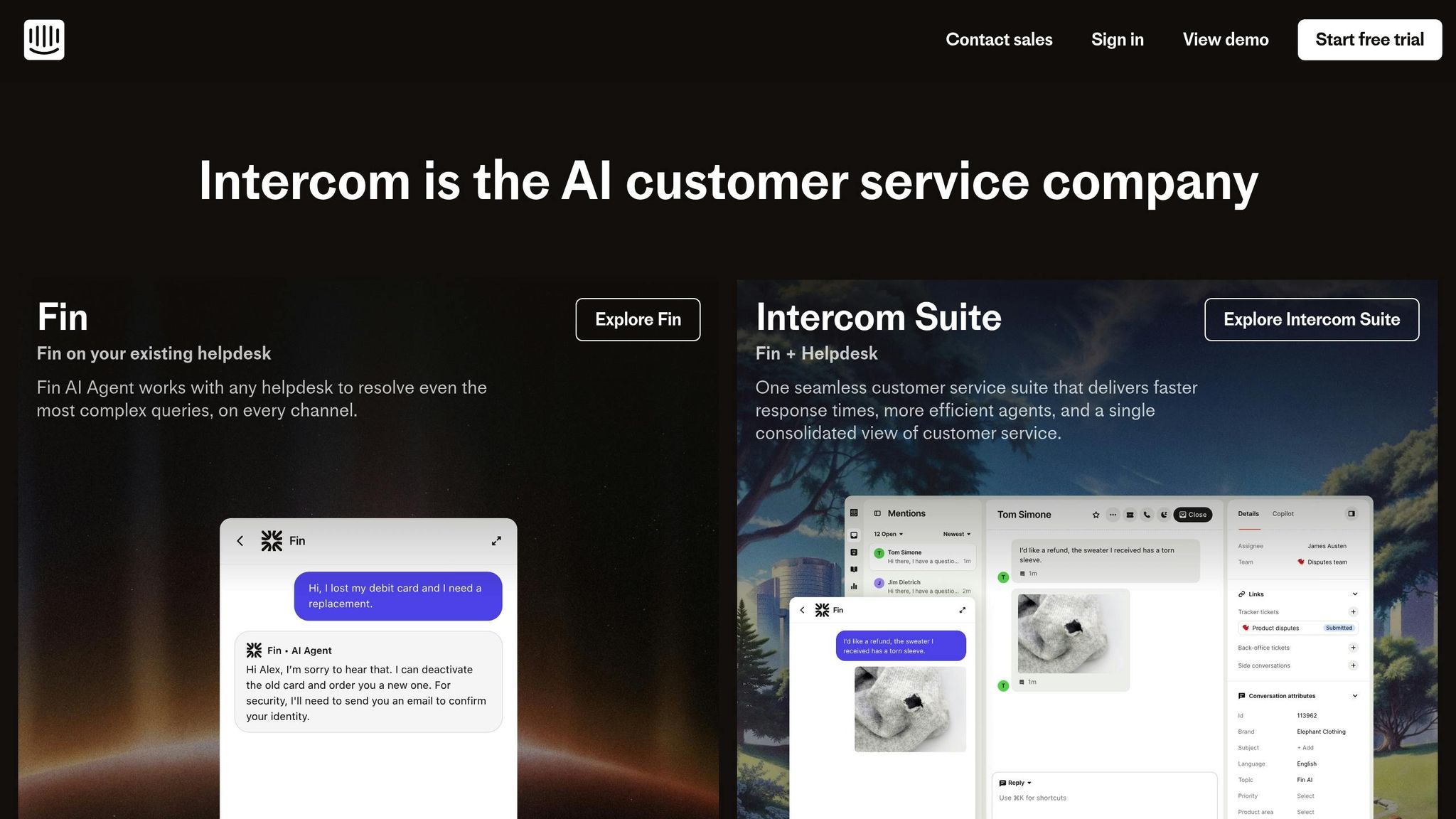
Core Purpose
Intercom provides real-time messaging and AI-powered automation tailored for e-commerce businesses. By combining live chat, smart bots, and streamlined messaging workflows, it helps resolve issues quickly while boosting sales through personalized customer interactions. This setup allows online retailers to offer immediate support and enhance the overall shopping experience.
Key Features
Intercom's standout features include its AI assistants - Fin AI Agent and Fin AI Copilot - which handle common customer inquiries and provide intelligent recommendations to support agents. Its unified inbox brings together conversations from live chat, email, and social media, ensuring no customer message slips through the cracks.
The platform automates repetitive tasks like tracking orders, managing returns, and responding to FAQs. Proactive messaging allows businesses to engage customers at critical moments, while tools like in-app messaging and product tours help guide users through the website. Additionally, built-in analytics provide valuable insights into customer support performance and satisfaction, making it easier for businesses to refine their strategies.
Best For
Intercom is ideal for growing e-commerce businesses that want to scale their customer support without significantly increasing team size. It's especially useful for companies balancing high volumes of inquiries with the need for personalized service. The platform is a great fit for businesses that require 24/7 support for tasks like order management, shipping updates, and return processes.
Pricing Model
Intercom follows a tiered, usage-based pricing structure that adjusts based on the size of the business and the volume of support needed. Costs depend on the number of active users and the extent of AI feature usage. A free trial is available, giving businesses a chance to explore its features and evaluate its impact before making a commitment.
Integrations
Intercom integrates seamlessly with platforms like Shopify, Magento, and WooCommerce, as well as various CRMs, payment processors, and marketing tools. Through its API and app marketplace, businesses can set up automated workflows, such as generating tickets for payment issues or sending follow-up messages based on customer purchase behavior.
5. Freshdesk
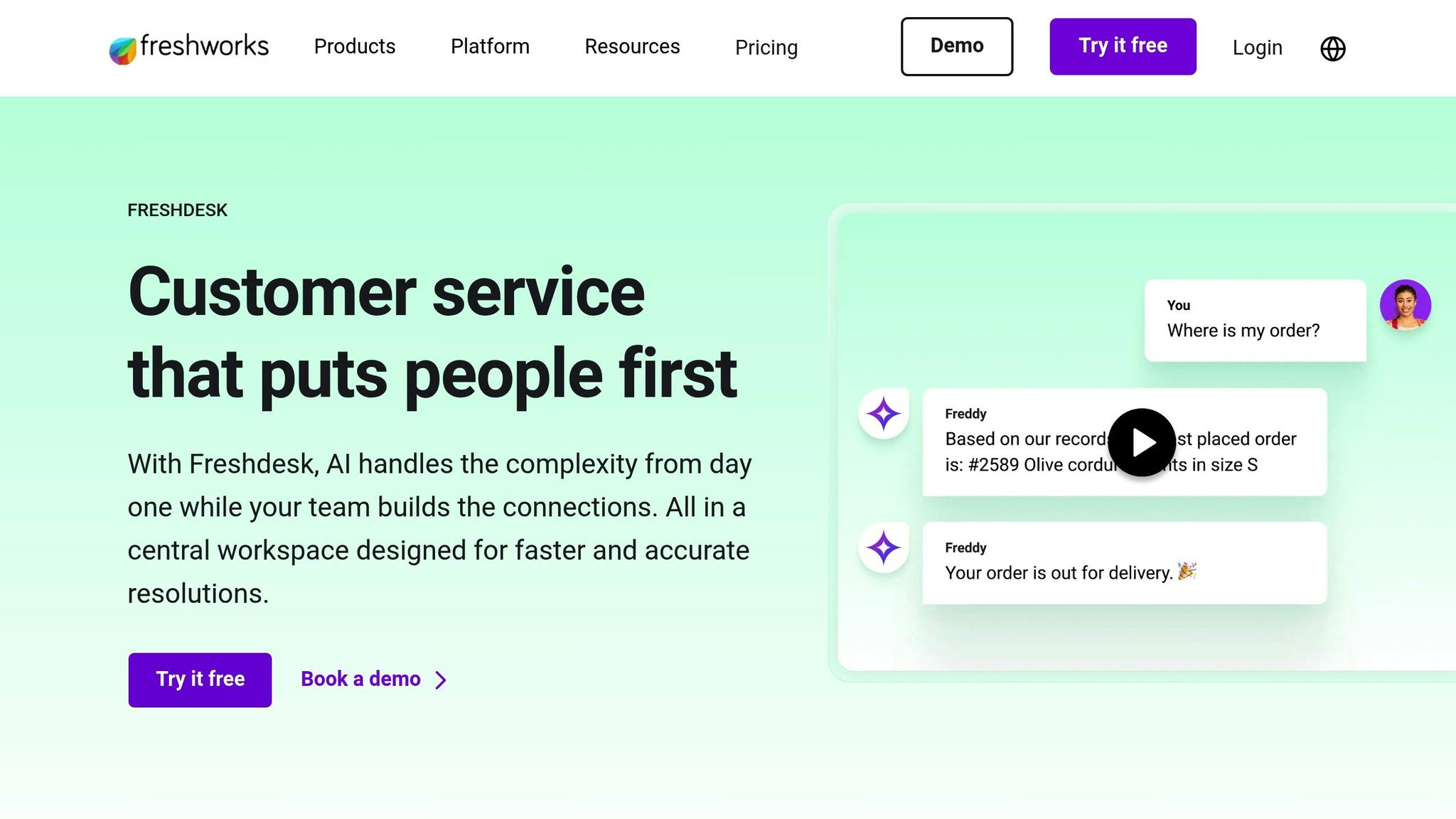
Core Purpose
Freshdesk brings all your customer support channels - email, chat, phone, and social media - into one place. This makes it easier to respond to customers quickly while automating repetitive tasks to keep satisfaction levels high.
Key Features
Freshdesk simplifies support by unifying multiple channels on a single platform. Its Freddy AI takes automation to the next level by categorizing tickets automatically, suggesting responses based on past interactions, and even offering predictive insights to solve issues faster. Additional tools include custom ticket workflows, self-service portals, and detailed reporting. Businesses using Freshdesk automation have reported up to 30% fewer tickets and a 25% faster first response time - a clear boost in efficiency.
Best For
Freshdesk is ideal for small to medium-sized e-commerce businesses or online stores that are scaling up. Its easy-to-use design and flexible pricing make it a great option for teams without extensive technical expertise. Plus, its advanced automation features are perfect for businesses handling high ticket volumes or experiencing rapid growth.
Pricing Model
Freshdesk offers tiered pricing based on the number of agents and features:
- Free Plan: Supports up to 10 agents.
- Growth Plan: Starts at $15 per agent/month (billed annually) and includes basic automation.
- Pro Plan: Priced at $49 per agent/month, adds advanced reporting and round-robin ticket routing.
- Enterprise Plan: At $79 per agent/month, includes Freddy AI, skill-based routing, and advanced analytics.
A 21-day free trial is available for those who want to test the platform before committing.
Integrations
Freshdesk works seamlessly with major e-commerce platforms like Shopify, WooCommerce, and Magento, allowing agents to view order details and handle returns directly from the helpdesk. It also integrates with tools like Slack, Salesforce, Mailchimp, and social media platforms, creating a unified system that improves workflow and speeds up response times.
6. Tidio
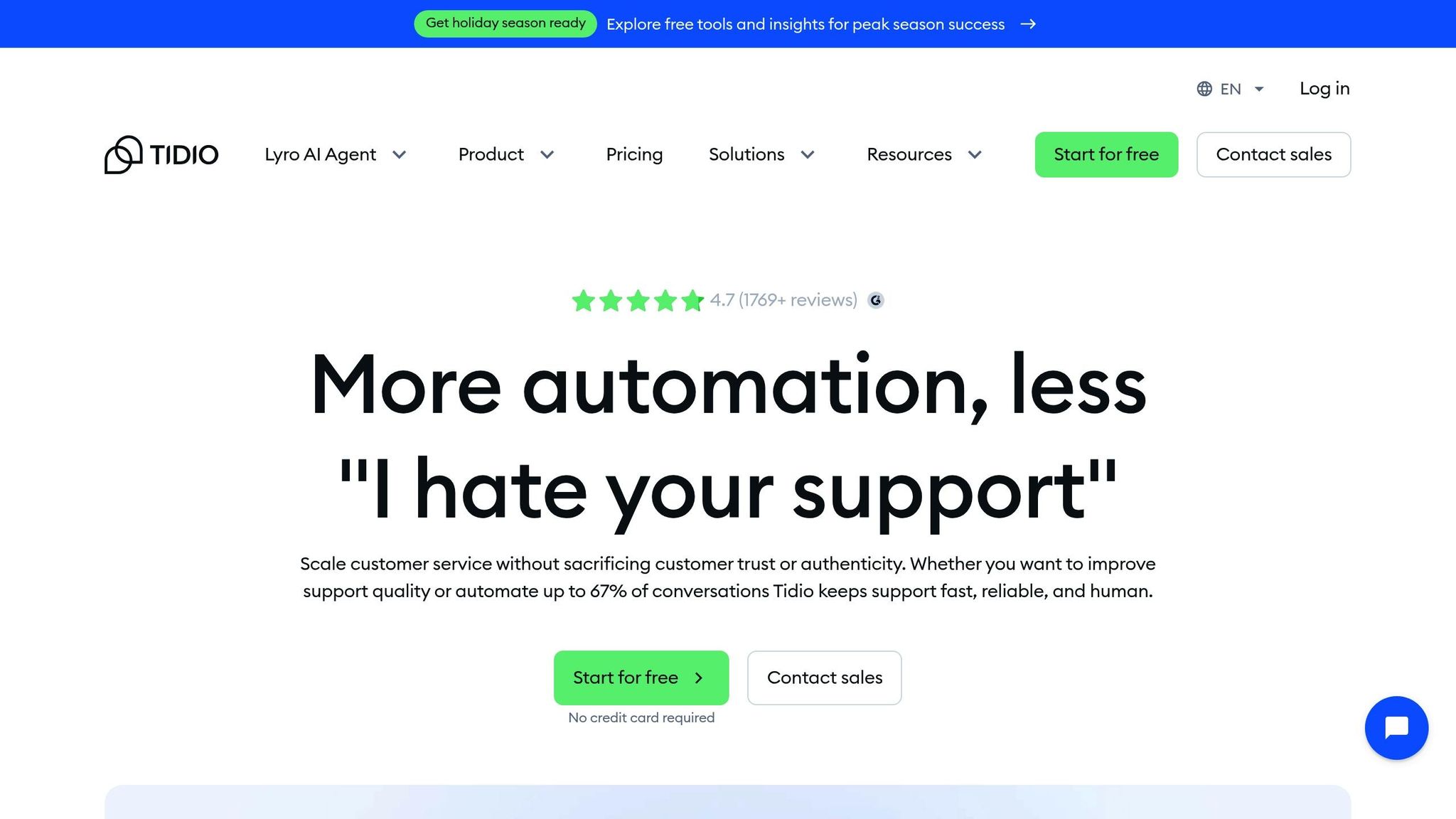
Core Purpose
Tidio brings together email, live chat, and social media conversations into a single inbox, making it easier to manage customer interactions. Built with e-commerce in mind, it uses AI-driven automation to handle up to 70% of customer inquiries without human involvement. This allows your team to dedicate their time to more complex issues that require personal attention.
Key Features
One of Tidio’s highlights is its Lyro AI agent, which efficiently handles common e-commerce questions about orders, shipping, and returns.
The platform also includes advanced email automation, live chat, and multichannel support, complete with AI chatbots tailored for e-commerce needs. What’s more, Tidio allows users to carry out tasks like processing refunds and exchanges directly within the helpdesk interface. For businesses opting for higher-tier plans, the platform offers resolution-rate guarantees, showcasing its reliability and effectiveness.
Best For
Tidio is a great fit for small to medium-sized e-commerce businesses looking for AI-powered customer support without the complexity of large-scale enterprise solutions. It’s particularly useful for online retailers seeking 24/7 customer service on a budget. With its straightforward design and quick setup, Tidio ensures businesses can get up and running without requiring extensive technical expertise. By lightening the workload for support teams and streamlining communication, it helps maintain high-quality customer service while improving efficiency.
Pricing Model
Tidio provides a free plan, with its basic paid plan starting at $24.17 per month. For those who want to explore its features before committing, a 7-day free trial is available.
Integrations
Tidio is designed for quick and easy setup, offering seamless integration with major e-commerce platforms and communication channels through its unified inbox. This makes it a go-to choice for small and medium-sized e-commerce stores eager to get started without delay.
With over 1,410 reviews and a 4.7-star rating, Tidio has earned praise for its intuitive interface, effective AI automation, and budget-friendly pricing for e-commerce businesses. These strengths make it a solid option for enhancing customer support in the e-commerce space.
7. Ada

Core Purpose
Ada simplifies customer interactions in e-commerce by automating up to 80% of inquiries using AI chatbots. This significantly cuts down on support costs and response times while providing instant, personalized assistance. By taking over repetitive tasks, it frees up teams to focus on more complex challenges.
Key Features
One of Ada's standout aspects is its no-code interface, which lets teams create, launch, and manage AI-driven chatbots without needing developer expertise. The platform uses natural language processing to deliver context-aware and personalized responses.
The AI can handle a wide range of e-commerce tasks, including checking order statuses, managing returns, offering product recommendations, and answering FAQs. It supports interactions across chat, messaging platforms, and social media, seamlessly escalating more complex issues to human agents when needed.
These capabilities make Ada an excellent choice for businesses looking to expand their support systems efficiently.
Best For
Ada works especially well for growing e-commerce businesses that face high volumes of repetitive customer inquiries. It’s ideal for companies aiming to speed up response times without expanding their human support teams.
The platform is also a great fit for businesses wanting to offer 24/7 customer support but lacking the resources for round-the-clock staffing. With multilingual support, Ada is perfectly suited for e-commerce companies serving international customers across various time zones and languages.
Pricing Model
Ada uses a custom pricing model tailored to each business. Pricing depends on factors like usage, number of interactions, and required integrations. Instead of fixed rates, Ada provides personalized quotes, ensuring the cost aligns with the business's size and needs. This flexible pricing structure complements its enterprise-level automation features and scales alongside a company’s growth.
Integrations
Ada seamlessly integrates with platforms like Shopify, WooCommerce, Zendesk, Gorgias, and Freshdesk. It also connects with messaging channels such as WhatsApp and Facebook Messenger.
These integrations allow Ada to access essential data, including order details, customer profiles, and support histories. This ensures the AI delivers accurate, context-aware responses while keeping workflows smooth across all customer touchpoints.
Businesses using Ada have reported impressive outcomes, including up to a 30% reduction in support ticket volume and a 20% boost in customer satisfaction scores within just three months of implementation. Additionally, Ada prioritizes security and compliance, meeting enterprise-level requirements for data protection and privacy.
sbb-itb-d1a6c90
8. Kustomer
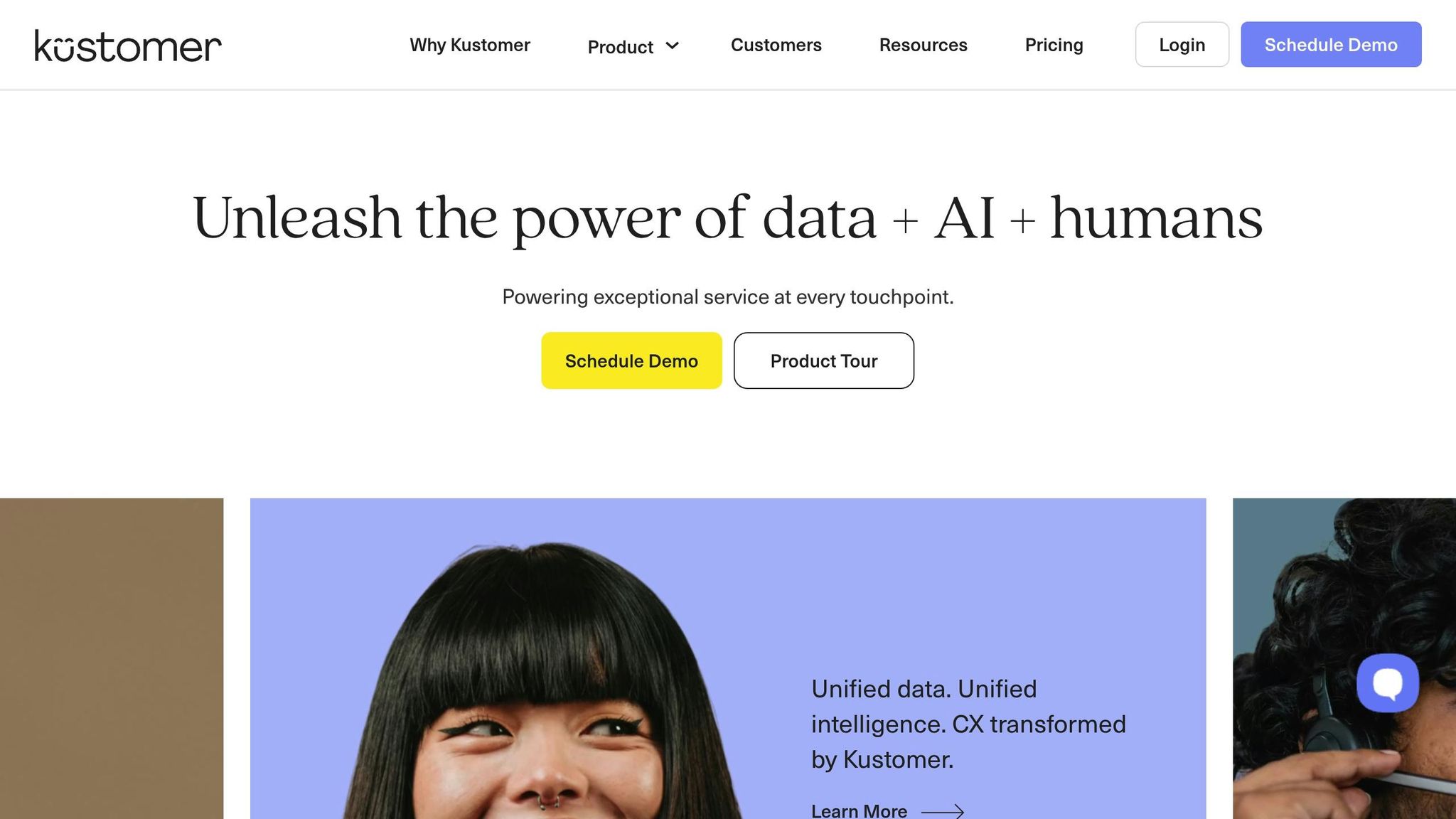
Core Purpose
Kustomer takes a unique approach to customer support by centralizing all interactions into a single platform. This system provides a complete view of the customer journey, simplifying workflows and automating repetitive tasks. One of its standout features is the 360-degree customer timeline, which consolidates every interaction, order history, and touchpoint into one easy-to-navigate view. This eliminates the need for agents to juggle multiple systems or repeatedly ask customers for the same information, creating a smoother and more efficient support experience.
Key Features
Kustomer stands out with its 360-degree timeline and advanced AI tools. Features like Kustomer IQ and AI Agents enable automated ticket routing, sentiment analysis, and handling of routine inquiries. The timeline gives agents instant access to a customer’s complete history, including purchases, past support tickets, shipping details, and even social media interactions. This level of detail allows for highly personalized and efficient service.
Additionally, Kustomer offers customizable workflows and a no-code builder to automate tasks like processing returns, issuing refunds, and updating orders. Built-in reporting tools help teams track performance metrics, agent productivity, and customer satisfaction. Together, these tools make Kustomer a powerful solution for delivering personalized service at scale.
Best For
Kustomer is ideal for e-commerce businesses and online retailers that handle high ticket volumes and operate across multiple channels. Its ability to unify customer interactions makes it especially useful for teams aiming to provide tailored support while managing complex workflows. Businesses looking to integrate AI-driven automation to meet growing customer demands for fast and efficient service will find Kustomer a strong fit.
Pricing Model
Kustomer offers custom pricing based on the size and needs of your business. The Professional plan starts at $89 per user per month when billed annually, while Enterprise plans cater to larger teams requiring advanced features. Although the costs are on the higher side, they reflect the platform’s robust automation and integration capabilities. Qualified businesses can explore the platform through a free trial or demo to see if it meets their needs.
Integrations
Kustomer integrates effortlessly with leading e-commerce platforms like Shopify, Magento, and BigCommerce. It also connects with payment gateways, shipping solutions, and popular CRM systems. For social commerce, it supports tools like WhatsApp, Facebook Messenger, and Instagram DM.
The results speak for themselves: businesses using Kustomer have reported cutting average handle times by up to 30%, improving first contact resolution rates by 25%, and boosting agent productivity by 20–40%.
9. Help Scout
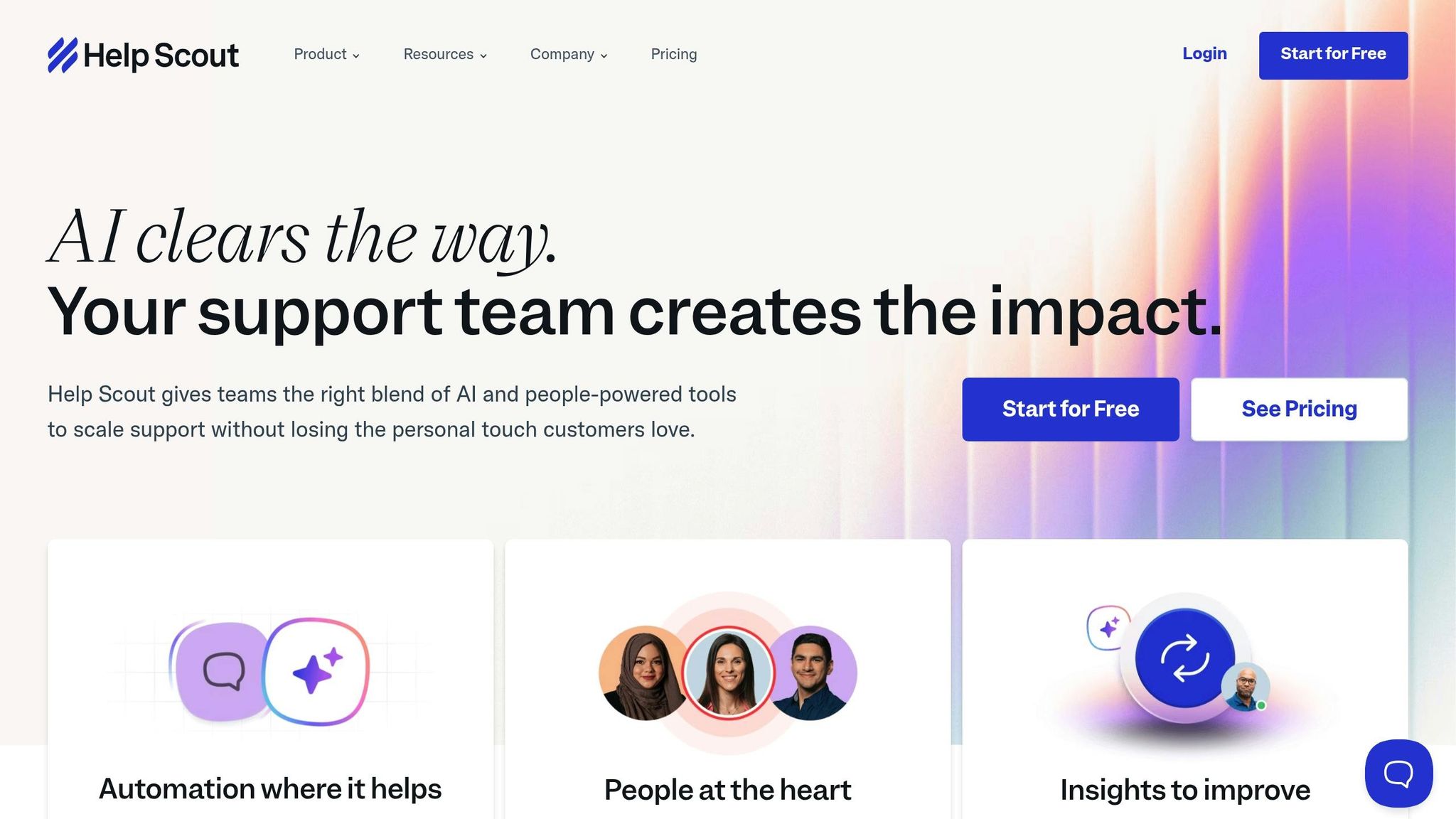
Core Purpose
Help Scout streamlines customer support by bringing together email, live chat, and social media inquiries into a single, easy-to-use platform. Using its Beacon chat widget, the tool ensures fast, consistent responses that keep customers happy. Its intuitive design allows teams to get up and running quickly, without the need for extensive training, making it easier to manage and respond to customer questions efficiently.
Key Features
At the heart of Help Scout is its shared inbox, which serves as a collaborative space where team members can assign tickets, track progress, and resolve customer issues together. The Beacon chat widget integrates live chat directly into e-commerce websites, fostering real-time connections between customers and support teams.
The Answers feature is a game-changer for handling repetitive questions. By tapping into the knowledge base, it provides instant answers to common queries, such as those about shipping, tracking, returns, or product details. This feature ensures customers receive help even outside regular business hours, making it particularly useful for e-commerce brands.
Help Scout also offers a Drafts feature, which helps agents save time by creating pre-written responses for frequently asked questions. This ensures that replies are consistent and professional. Additionally, the platform includes reporting and analytics tools to monitor important metrics like first response time, resolution speed, and customer satisfaction, giving businesses valuable insights into their support operations.
Best For
Help Scout is an excellent fit for small to mid-sized e-commerce businesses that need scalable support to serve customers across different time zones. It’s especially useful for companies that can’t provide 24/7 live support, as the automated Answers feature ensures customers still receive timely assistance.
For businesses dealing with a high volume of repetitive inquiries, Help Scout’s automation features can save time and resources. It’s also a great choice for teams that value simplicity and quick setup over highly customizable features.
Pricing Model
Help Scout offers tiered subscription plans based on the number of users and available features. A free trial is available, allowing businesses to explore the platform before committing to a paid plan. While specific pricing details vary, Help Scout is designed to be an affordable option for smaller e-commerce businesses, making it a smart choice for teams working with tighter budgets.
The pricing structure is flexible, enabling businesses to start with basic plans and scale up as their support needs grow.
Integrations
Help Scout integrates seamlessly with popular e-commerce platforms like Shopify, WooCommerce, and Magento, giving agents direct access to order details, customer profiles, and purchase history without needing to switch between systems. This integration simplifies customer interactions and boosts efficiency.
The platform also connects with marketing tools, productivity apps, and analytics platforms, creating a unified support system. These integrations help automate workflows and ensure that customer data stays consistent across all business tools.
With a 4.4/5 rating on major review platforms, Help Scout is frequently praised for its clean interface, effective automation tools, and ease of use. Its focus on unifying customer communications makes it a go-to solution for e-commerce businesses looking to provide seamless omnichannel support.
10. Richpanel

Core Purpose
Richpanel is designed to lighten the load on support teams by automating tasks and offering self-service options. By deflecting up to 60% of repetitive support tickets, it helps e-commerce businesses streamline customer interactions across various channels while empowering customers to solve common issues on their own.
Key Features
One standout feature is the self-service portal, which can be customized to fit a brand's specific workflows. This portal efficiently handles routine e-commerce queries like order tracking, returns, and FAQs - no agent needed.
Richpanel's multichannel inbox brings together email, live chat, and social media conversations in one place. Automated workflows ensure tickets are routed according to preset rules, saving time and effort. The platform also includes integrated analytics and reporting tools, giving businesses the ability to track support performance, customer satisfaction, and agent productivity. For brands managing multiple e-commerce storefronts, the multi-store management feature allows centralized support, making it easier to oversee operations. These capabilities align with the goal of simplifying customer support for e-commerce businesses.
With its comprehensive set of features, Richpanel stands out as a strong contender among customer support tools.
Best For
Richpanel is a great fit for small to medium-sized e-commerce businesses looking to automate their support processes and reduce ticket volume without the need for large support teams. It's especially useful for online stores that frequently deal with order-related questions, returns, and product inquiries, as these can be efficiently handled through self-service options. For businesses aiming to cut support costs while improving customer satisfaction, Richpanel’s automation and ticket deflection features are particularly appealing.
Pricing Model
Plans start at $249 per month for up to 1,000 conversations, making it a mid-tier option for growing e-commerce businesses. Custom pricing is available for larger companies or those with higher support needs. While the cost might be a hurdle for very small businesses or startups, the savings from reduced staffing requirements can help offset the expense.
Integrations
Richpanel integrates seamlessly with platforms like Shopify, Magento, and WooCommerce, providing real-time order data and customer context. It also connects with payment gateways, email marketing tools, and shipping providers, ensuring smooth data flow between support and sales operations. With a 4.7/5 rating on G2 as of 2025 and over 1,500 e-commerce brands leveraging its tools worldwide, Richpanel is highly regarded for its ease of use, self-service capabilities, and ability to significantly cut down on ticket volume.
7 Best eCommerce Help Desk Software for Better Customer Service
Tool Comparison Chart
Choosing the right customer support tool can feel overwhelming, but a side-by-side comparison makes it easier. Below, you'll find a breakdown of pricing, integrations, AI capabilities, multi-channel support, and free trials to help you decide.
| Tool | Starting Price (USD) | E-commerce Features | AI Functions | Multi-channel Support | Free Trial |
|---|---|---|---|---|---|
| Yuma AI | Performance-based | Deep Shopify & BigCommerce integration | AI agents, autopilots, social automation | Email, chat, social media | 30 days |
| Gorgias | ~$10/month (Starter) | Native Shopify, BigCommerce, WooCommerce | AI ticket triage, sentiment detection | Email, chat, social, SMS | Yes (varies) |
| Zendesk | $19/agent/month (Suite Team) | 1,000+ integrations including major platforms | AI chatbots, real-time agent assistance | Email, chat, phone, social, SMS, WhatsApp | 14–30 days |
| Intercom | $39/month (Starter) | Shopify, WooCommerce integrations | Fin AI, workflow automation | Email, chat, social media | 14 days |
| Freshdesk | $15/agent/month (Growth) | Shopify, WooCommerce, Magento | Freddy AI for automation | Email, chat, phone, social | 21 days |
| Tidio | $24.17/month (Starter) | Shopify, WooCommerce, BigCommerce | Lyro AI chatbot for live chat | Email, chat, social media | 7 days |
| Ada | Custom | Shopify, Salesforce integrations | Advanced AI chatbot, automation | Chat, social media, SMS | Yes |
| Kustomer | Custom | Shopify, Magento, BigCommerce | Kustomer IQ, AI agent assistance | Email, chat, social, SMS | Yes |
| Help Scout | $20/user/month (Standard) | Shopify, WooCommerce integrations | Automated answers, smart routing | Email, chat, social, phone | 15 days |
| Richpanel | Custom | Shopify, Magento, WooCommerce | AI workflows, automated routing | Email, chat, social media | Yes |
Key Insights from the Comparison
Pricing Models
Understanding pricing is essential. Options range from performance-based fees like Yuma AI to tiered pricing plans like Zendesk's, which starts at $19 per agent per month. For smaller stores, Gorgias offers an affordable entry point at around $10 per month. Zendesk also provides advanced AI features through its Agentforce AI add-on for $125 per user monthly (billed annually).
AI Capabilities
Each tool varies in its AI offerings. Yuma AI focuses on performance-driven AI agents, while Gorgias is tailored for ticket triage and sentiment analysis. Zendesk stands out with proactive chatbots and real-time agent support, while Tidio’s Lyro AI specializes in live chat automation.
Multi-channel Support
Many platforms provide robust coverage across email, chat, phone, social media, and messaging apps. This ensures customers can connect through their preferred communication channels.
E-commerce Integrations
Seamless integration with e-commerce platforms is crucial for streamlining operations. Tools like Yuma AI and Gorgias excel in this area, offering deep native integrations with Shopify and WooCommerce. These integrations allow tasks like order status checks and automated returns to happen without switching between systems.
Free Trials
Testing tools before committing is invaluable. Yuma AI provides a generous 30-day trial, while Zendesk offers 14 to 30 days depending on the plan. Freshdesk gives 21 days, and Tidio offers a shorter 7-day trial. Use these trials to see how each tool fits into your workflow.
Finding the Right Fit
Your choice depends on your business needs. Smaller stores that rely heavily on Shopify and need AI-powered chatbots might find Yuma AI or Gorgias ideal. Larger enterprises looking for advanced customization and integrations may lean toward Zendesk or Intercom. Take advantage of free trials to ensure the tool aligns with your existing systems and goals before committing.
Conclusion
This review of the top 10 customer support tools highlights how these solutions can reshape e-commerce operations. Broadly, these tools fall into two categories: traditional platforms and AI-first solutions. Traditional options like Zendesk, Help Scout, and Freshdesk focus on consolidating multi-channel conversations into a single dashboard, streamlining ticket management with automation and workflows. On the other hand, AI-first tools like Yuma AI and Gorgias leverage artificial intelligence to automate ticket resolution, relying on e-commerce-specific data to handle common queries and gauge customer sentiment. Choosing the right tool depends on your team size, budget, and integration needs.
Team size plays a key role in selecting the appropriate tool. For smaller e-commerce teams with fewer than 20 agents, AI-first platforms often provide quicker setup and immediate benefits. Larger teams with 20 or more agents handling high ticket volumes may find traditional platforms like Zendesk more suitable, as they offer enterprise-level features and advanced analytics - though they might require external assistance for complex configurations.
Pricing models vary significantly, ranging from per-ticket fees to per-agent subscriptions. Some platforms also offer performance-based pricing, where you pay based on resolutions rather than the number of users. Evaluating these options can help you align costs with your support needs.
Integration capabilities are another critical factor. Most e-commerce businesses already rely on platforms like Shopify, BigCommerce, or WooCommerce, along with existing helpdesk systems. Seamless integrations save time by eliminating manual data entry and giving agents instant access to customer information. Yuma AI stands out in this area, offering compatibility with major platforms like Zendesk, Gorgias, and Kustomer without requiring costly migrations.
Beyond integration, modern support demands advanced AI and multi-channel capabilities. AI-powered chatbots can resolve up to 70% of customer inquiries, cutting response times and reducing costs. Multi-channel support - covering email, chat, social media, SMS, and phone - is now essential for meeting customers wherever they are. The best approach combines automation for 40-60% of inquiries with human agents handling more complex, empathy-driven issues.
Finally, take advantage of free trials to test how well a tool fits into your workflow. Make sure the platform you choose can scale with your business, integrate smoothly with your existing systems, and ultimately enhance customer satisfaction and operational efficiency.
FAQs
What’s the best way to choose a customer support tool for my e-commerce business based on my team size and budget?
Choosing the best customer support tool for your e-commerce business comes down to understanding your unique needs, team size, and budget. Start by pinpointing the features that matter most to your team - whether it’s live chat, ticket management, or even AI-driven support options. Once you’ve outlined your must-haves, match them with tools that offer flexible pricing plans, so your solution can grow alongside your business.
For smaller teams, look for tools that are easy to set up and require little to no training. On the other hand, larger teams might benefit from platforms that offer advanced integrations and multi-channel support to handle a higher volume of customer interactions. Taking advantage of free trials or demos is a smart way to test a tool’s fit before committing to a subscription.
What AI features should I look for in a customer support tool to improve ticket resolution?
When selecting a customer support tool, it's smart to focus on AI-powered features that can boost efficiency and make handling tickets smoother. Here are a few standout capabilities to consider:
- Automated ticket classification: AI helps by sorting and prioritizing tickets based on factors like urgency or topic, speeding up response times.
- Chatbots with natural language processing (NLP): These bots can handle common questions instantly, taking some pressure off your support team.
- Predictive analytics: AI can predict customer needs or highlight potential problems before they turn into bigger issues.
These tools don't just speed up resolutions - they also make support more tailored and efficient, which keeps customers happier.
Why is it important for customer support tools to integrate with your e-commerce platform?
When selecting a customer support tool for your e-commerce business, integration capabilities should be high on your priority list. A tool that integrates smoothly with your existing platform brings everything together - order history, shipping details, and account information - making it easy for your support team to access all the data they need in one place.
This streamlined access doesn’t just save time; it equips your team to deliver quicker, more tailored responses to customer inquiries. The result? Happier customers and a more efficient support process. Plus, integration can take a load off your team by automating repetitive tasks and reducing the risk of errors, giving them more time to focus on what truly matters: solving customer problems.


